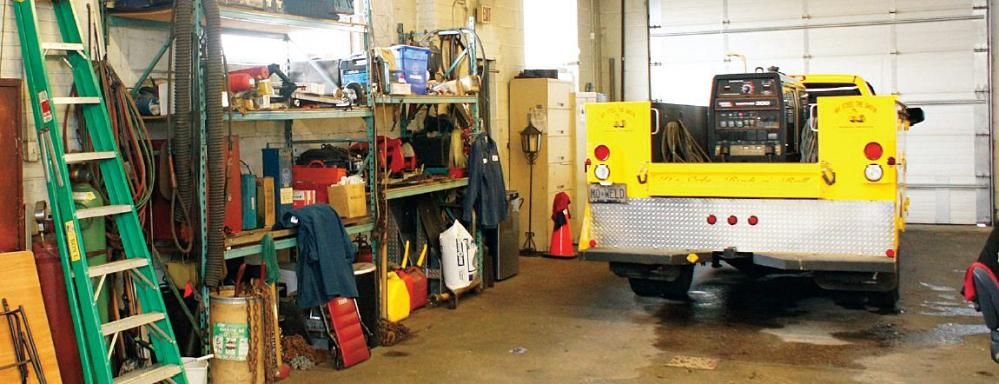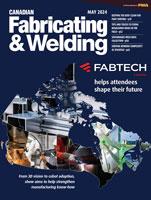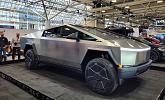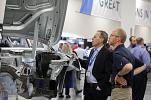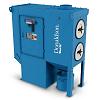- FMA
- The Fabricator
- FABTECH
- Canadian Metalworking
Business Profile: Mobile Welding
Success in mobility.
- By Nestor Gula
- April 28, 2015
- Article
- Fabricating
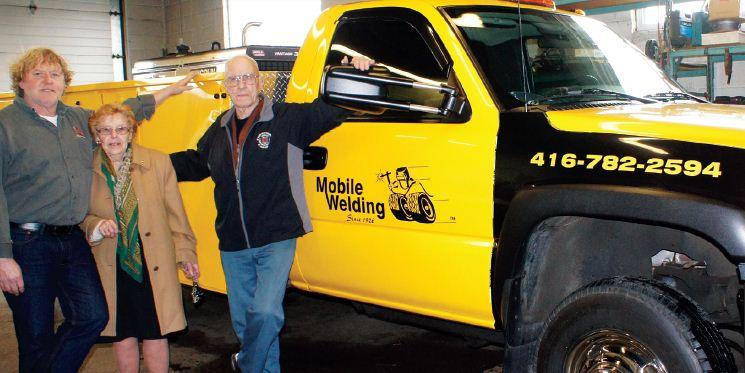
(L-R) Jeff, mother Elizabeth, and father Jack in front of one of the trucks in the shop. PHOTO: NESTOR GULA
It is usually a good thing to pick up a ringing phone. Sure, it might be a salesman asking about your ducts, but it also can lead to a great opportunity.
Such a call was answered in 1994 by Jeff Arnold, president of Mobile Welding Inc. It was a call from a concert promoter. The job was to assemble, fabricate and install the stage for Pink Floyd’s 1994 tour. This also led them to work on the stage for that year’s Rolling Stones Voodoo Lounge tour and the Bridges to Babylon Tour in 1998. They have worked on many rock show stages since then including 2003’s SarsStock, which featured the Rolling Stones, AC/DC and Rush among others.
Mobile welding is known for its quality work. The company has been in business since 1926. It was founded by Jeff’s grandfather, John Arnold, as J. T. Arnold Blacksmithing and Welding.
“My grandfather was in military school when he was 12 years old,” says Jeff. He came to Canada in 1925 and moved to North York to start his blacksmithing business. “The original location was at Dufferin and Lawrence, which is not too far from where we are right now,” he says.
The original work of the shop was forging horseshoes and ornamental jobs. “It is funny that we still get calls to repair railings and it’s my grandfather’s work,” says Jeff. “I know that because of his markings…He built the fences at Bayview and Lawrence and part of the fencing at Queens park.”
When World War II erupted, both Jeff’s father, Jack, and grandfather, John, enlisted in the Canadian Army and served in Europe. After the war the nature of the business had changed. It became less serving the farming community and more about building and helping shape the infrastructure of what is now the Greater Toronto Area.
Jack Arnold, who is now retired, says, “I worked mostly on heavy equipment and pipes when I came back from the army…I decided to work with dad.” After taking over the business, Jack thought of a name change to reflect the new business model. “I was looking at the truck with the machine on the back and just came up with the name Mobile Welding. This was about 1952. There was no other company that had that name,” he says.
In the early days the welding that they did was forge welding, and then the company moved to oxy-acetylene. “Welding happened ever since I was a kid,” says Jack. “We got our first electrical welding machine in 1928-1929. It was called a Jukebox welder back then.”
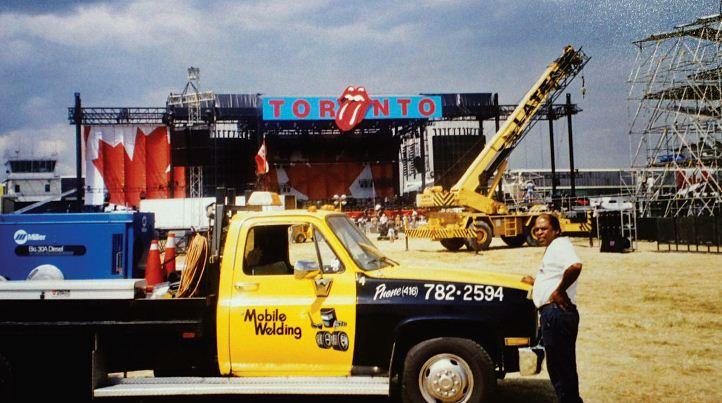
The Mobile Welding truck at the Downsview field assisting the assembly of the SarsStock stage in 2003. PHOTO COURTESY OF MOBILE WELDING INC.
He notes the company was very active in the development of the area’s infrastructure. “We worked on most of the bridges on the QEW from Toronto to Hamilton,” he says.
“There isn’t a building in downtown Toronto that we weren’t involved in,” boasts Jeff. “In 1997 we worked on installing the elevators on the north side of the CN tower. We did the First Canadian Place and the TD Centre. We did a lot of work at York University. We made railings for Ontario Place. In fact, when the City of Toronto was making its first water plants and water mains, my grandfather worked on them. We have dealt with the City of Toronto since 1926 and we still have contracts with them.”
After several years of working with his dad, Jeff bought the company in 1980.
For its long history and list of impressive projects, Mobile Welding occupies a very modest 3,000 square foot shop in the north-west area of Toronto. “At any given time we have four or five trucks on the road,” says Jeff. All the trucks are equipped with diesel Lincoln Electric Vantage 140 and 300 series welders.
The building is just storage. This is where the trucks can pick up what they need as they are meant to be self-sufficient during the day. They also use a combination of Miller and Lincoln portable MIG and Stick welders.
Most of the work that this company does is done using the Shielded metal arc welding (SMAW) process. “We primarily use stick welding. We have the welders set up for Aluminum MIG, but I prefer not to run the MIG at all for steel welding,” says Jeff. “We tried MIG with some bridge work and I’m still a fan of 7018 5/32 and 1/8 rod. I know I will get proper penetration. When we get to a job site and I am using a moisture resistant rod, I know I will have positive penetration when compared to the seal with MIG or solid core wire. We use portable heaters, put the rod in to get it up to the proper temperature and we do not have an issue.”
All the employees are certified welders with the Canadian Welding Bureau.
New technological advances in welding systems impress Jeff. “Technology is changing. There are new machines out there all the time. The machines are getting lighter. The inverters come in suitcases. They are great,” he says. “They have a smart switch and can plug into 110 or 220. We can plug into an elevator shaft with 120 outlet and they burn 3/32 7018 rod. And I am not running 500 feet of cable trying to get up an elevator shaft. You walk in with a suitcase, plug it in, and an hour later you are done.”
There are several items on Jeff’s wish list of equipment that would make his business more productive and profitable. “Give me the machine that I have but lighter,” he laughs. “That’s a four-cylinder Perkins diesel in that welder. I would love to have a portable amperage control so that I could change the amperage when I am in an overhead, vertical or horizontal position. Your heat ranges are always different when you are doing your groove pass or your cap. It is available and you want it but then it comes down to do you need it. I guess eventually I’ll get it.” He notes that he has mulled about a laser set up to make cuts on plates so that he can walk into a job site and all the parts are perfect and do not require grinding. “Eventually somebody will convince me that portable MIG is the way to go, so I will downsize the machines and save fuel. But right now I am not there,” he says.
He is rather optimistic about the future as the need for his service is steady and most likely will not go away. “Welding is not as big now as it used to be, but it is more technical than it used to be,” he says. “What I am telling the welding schools is that they have to get up to speed on the equipment.”
About the Author
subscribe now


Keep up to date with the latest news, events, and technology for all things metal from our pair of monthly magazines written specifically for Canadian manufacturers!
Start Your Free Subscription- Industry Events
Automate 2024
- May 6 - 9, 2024
- Chicago, IL
ANCA Open House
- May 7 - 8, 2024
- Wixom, MI
17th annual Joint Open House
- May 8 - 9, 2024
- Oakville and Mississauga, ON Canada
MME Saskatoon
- May 28, 2024
- Saskatoon, SK Canada
CME's Health & Safety Symposium for Manufacturers
- May 29, 2024
- Mississauga, ON Canada













